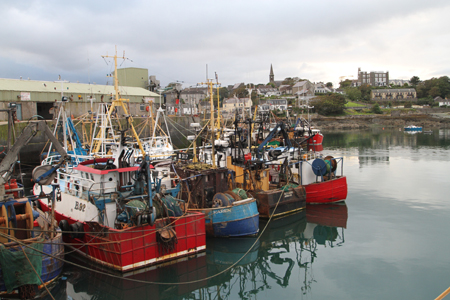SOUTH Down MP Margaret Ritchie (SDLP) has secured a fisheries debate in the House of Commons on Thursday 6 December ahead of the annual meeting of EU Fisheries Ministers in Brussels which commences later in the month and extends into December.

Speaking as the lead MP on the debate Ms Ritchie commented: “It was absolutely critical to secure this debate and I am delighted to have done so. It is important that those of us who represent fishing communities have a chance to put forward our case ahead of the upcoming negotiations in Brussels that will determine this year’s quota allocations.
“The fishing industry, in my own constituency and across the North, has faced challenging times and it is crucial that the quotas do not bring further pain by restricting allocations for valuable stock such as cod and nephrops
“I will also be pressing our case on the wider, long-term reform of the EU Common Fisheries Policy. The EU Member States will be determining vital policy on reform and on the issue of discards. The outcome of these reforms will shape our fishing communities for generations and it is vital that we get it right to avoid being lumbered for another ten years with the ineffective system we have at present.
“Through this debate I will be pushing for policy reform that provides an economically viable future for our fishermen and a sustainable marine environment.”
* * *

The fishing sector in Co Down has faced a raft of restrictions, measures and issues over recent years and this process is still unfolding.
Recently in July fishermen had to make some significant technical changes to prawn nets to comply with EU regulations which will mean a drop in prawn catches; they have seen decreasing fish and prawn quotas; the age of the local fleet stock is increasing; Philipino crewmen may soon be asked to leave the country as required by the Border Agency; and there are a number of environmental pressures such as protected zones at sea and the development of marine wind farms and sea turbines to harness energy.
Added to this is the crucial factor of the instability of the Spanish Euro, and the general economic recession. Currently many fishermen feel under pressure. They will be looking for a good round at the EU Fisheries Summit in December, but going on past history, there is a mood of pessimism prevalent, and only a complete shake-up of the EU Common Fisheries Policy will dispel this gloom.
Many Member States are seeking change. This may just be the year when the future brightens up for the fishing industry in Northern Ireland, much beleaguered in recent years with drops in prawn and fish quotas, limitations on the herring quota, and the decimation of its white fish fleet.
The seafood industry has the potential to create many primary and value-added sector jobs, but the seas will have to be better managed.
Those are the challenges that lies ahead for the fishing industry and its communities.

























